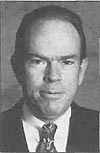 |
Home | Search | Browse | About IPO |
Staff |
Links |
Names

|
Bilandic Michael A. Bilandic, 70, of Chicago, Supreme Court justice since 1990, was named chief justice of the state's high court on November 23. He will begin serving his three-year term on January 1, 1994. Bilandic succeeds Benjamin K. Miller, who will remain as a justice on the Supreme Court serving out the remaining year of his 10-year term. |
After leaving the mayor's office, Bilandic returned to private law practice as a partner in the firm Bilandic, Neistein, Richman, Haus-linger and Young. In 1984 he was elected to the First District Appellate Court, where he served until elected to the Supreme Court.
Bilandic earned his bachelor's degree from St. Mary's College, Winona, Minn., and his law degree from DePaul University, Chicago.

|
Reilly joins Edgar On December 1, Jim Reilly, 48, of Chicago took over the duties of Gov. Jim Edgar's chief of staff. He held the same job from 1983 to 1989 under Gov. James R. Thompson. Reilly replaces Kirk Dillard of Hinsdale, who resigned to run for the state Senate seat of Thomas J. McCracken, Jr. (R-41, Downers Grove). McCracken resigned to head the Chicago Regional Transit Authority. |
Before accepting the position in the Edgar administration, Reilly was chief executive officer for the Metropolitan Pier and Exposition Authority, which oversees McCormick Place in Chicago.
Reilly represented the Jacksonville area in the Illinois House from 1977 to 1983. He headed Edgar's transition team when Edgar was elected secretary of state in 1981, and the two worked closely after Reilly left the House in 1983 to be chief counsel to the Thompson administration and later chief of staff and deputy governor.
Reilly is a 1967 graduate of Illinois College in Jacksonville. He earned his law degree from the University of Chicago's Law School in 1972.
Leininger resigns as
state superintendent
of education
After 34 years of public service and superintendent of education for the last four, Robert Leininger, 55, of Springfield is leaving the public arena of education at the end of February to take a job as a senior vice president for Magna Group Inc., a multibank holding company with 103 community banking locations in Illinois and Missouri.
"This was not an easy decision ...," said Leininger. "But, in the final analysis, it is an offer too good to pass up." At Magna, he will be responsible for setting up a public finance department and developing business for the banking system with school districts, government agencies and municipalities.
Leininger was appointed superintendent of education in 1989 after having served 13 years on the staff of the State Board of Education. Before joining the agency, Leininger was a teacher, principal and superintendent in several school districts in the northwestern part of the state, beginning in Prophetstown in 1960. He went on to serve the Lyndon and Fulton school districts. In 1974, Leininger was the youngest district superintendent chosen as president of the Illinois Association of School Administrators.
Edgar names workers'
compensation task force
Gov. Edgar named a 14-member task force on November 19 to develop recommendations for reforming the state's workers' compensation program. The task force is composed of representatives from organized labor and the business community.
Edgar named Greg Baise, president of the Illinois Manufacturers' Association, Chicago, and Don Johnson, president of the Illinois AFL-CIO, Springfield, as cochairmen of the task force, which is to report early in 1994 its recommendations for reforms for the General Assembly to consider this spring.
The governor set no specific goals for the task force, but he did ask its members to honor the four goals of the workers' compensation system: Provide workers with adequate benefits in a timely manner; contain employers' costs and keep the state's insurance rates competitive with other states; administer the law effectively, including timely resolution of cases; and increase understanding of the caus-
28/January 1994/Illinois Issues
|
|